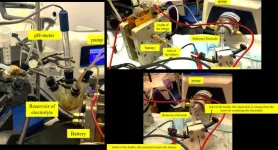(Press-News.org) TUCSON, Arizona — The results of a clinical trial led by researchers at the University of Arizona Health Sciences and published in the Journal of Clinical Oncology showed that chemotherapy combining three different types of drugs did not improve overall survival for patients with advanced stage, inoperable biliary tract cancers.
“Biliary tract cancer is comparatively rare, but it’s aggressive and spreads fast. Our accrual of more than 450 patients in a little more than two years really shows there is a need for new ways to help people with biliary tract cancer,” said Rachna Shroff, MD, the associate director of clinical investigations at the U of A Cancer Center and leader of the clinical trial that included researchers from 17 other cancer centers.
“The two-drug regimen was the standard for over 10 years, and it’s not particularly effective,” said Shroff, a professor and chief of the Division of Hematology and Oncology in the Department of Medicine at the U of A College of Medicine – Tucson. “While there are some newer precision treatments that are helpful to a small segment of the overall population, we need more and better options for all patients.”
The study was the first Phase III clinical trial conducted entirely in the United States for newly diagnosed, advanced biliary tract cancer patients. Aaron Scott, MD, co-leader of the U of A Cancer Center Clinical and Translational Oncology Program and an associate professor at the U of A College of Medicine – Tucson, co-chaired the study and was a contributing author.
“Triplet chemotherapy has been shown to be somewhat effective in treating advanced and inoperable pancreatic and colorectal cancers,” said Shroff, a member of the BIO5 Institute. “We wondered if a similar approach to treating advanced and inoperable gall bladder and bile duct cancers could also lead to better outcomes. But we now have evidence that it may not work the same way in biliary tract cancers.”
The clinical trial included an analysis of data from 441 participants who were newly diagnosed with inoperable or metastatic biliary tract cancers. They were randomly assigned to either a two-drug regimen of gemcitabine and cisplatin or a triplet chemotherapy consisting of gemcitabine, cisplatin and albumin-bound paclitaxel.
“Comparing results from the two regimens showed no significant difference in the average length of time the patient survived after diagnosis with advanced, inoperable biliary tract cancer,” Shroff said. “Our research also indicates that the three-drug regimen may increase the toxicity of the treatment.”
Shroff noted that the three-drug regimen might still prove to be a viable option for patients with specific biliary tract cancers, such as gallbladder cancer, and for those whose cancer has not metastasized, as the response rates and survival outcomes were higher in these groups.
Ongoing analyses will involve identifying subsets of biliary cancer patients who may benefit from the three-drug regimen. Tissue and blood specimens collected from participants during the trial resulted in the largest repository of biliary cancer specimens in the United States.
The research was supported in part by the National Cancer Institute, a division of the National Institutes of Health, under award nos. CA180888, CA180819, CA180820, CA180821 and CA180868.
END
U of A Cancer Center clinical trial advances research in treatment of biliary tract cancers
Experimental, three-drug chemotherapy regimen didn’t improve survival rates for patients, but treatment might still prove helpful for a small subset of patients.
2025-01-16
ELSE PRESS RELEASES FROM THIS DATE:
Highlighting the dangers of restricting discussions of structural racism
2025-01-16
PHILADELPHIA (January 16, 2025) – A new Health Affairs Health Policy Brief highlights the detrimental impact of recent state and federal policies that restrict discussions of “divisive concepts,” including structural racism. It warns that these policies undermine efforts to address health inequities and improve population health.
“By limiting discussions of structural racism, these policies ignore the historical and environmental factors that shape health outcomes,” said co-author Derek Griffith, PhD, the Risa Lavizzo-Mourey ...
NYU Tandon School of Engineering receives nearly $10 million from National Telecommunications and Information Administration
2025-01-16
NYU Tandon, collaborating institutions and industry partners have been awarded nearly $10 million to develop next generation communications technology.
The project, dubbed SALSA (Spectrally Agile Large-Scale Arrays), is funded by the U.S. Department of Commerce's National Telecommunications and Information Administration (NTIA) to advance U.S. leadership in open, secure communications infrastructure.
SALSA aims to create advanced wireless systems that operate in the "upper mid-band" spectrum — a region of frequencies relatively ...
NASA scientists find new human-caused shifts in global water cycle
2025-01-16
In a recently published paper, NASA scientists use nearly 20 years of observations to show that the global water cycle is shifting in unprecedented ways. The majority of those shifts are driven by activities such as agriculture and could have impacts on ecosystems and water management, especially in certain regions.
“We established with data assimilation that human intervention in the global water cycle is more significant than we thought,” said Sujay Kumar, a research scientist at NASA’s Goddard Space Flight Center in Greenbelt, Maryland, and a co-author ...
This tiny galaxy is answering some big questions
2025-01-16
Leo P, a small galaxy and a distant neighbor of the Milky Way, is lighting the way for astronomers to better understand star formation and how a galaxy grows.
In a study published in the Astrophysical Journal, a team of researchers led by Kristen McQuinn, a scientist at the Space Telescope Science Institute and an associate professor in the Department of Physics and Astronomy at the Rutgers University-New Brunswick School of Arts and Sciences, has reported finding that Leo P “reignited,” reactivating during a significant period on the timeline of the universe, producing stars when many other small galaxies didn’t.
By ...
Large and small galaxies may grow in ways more similar than expected
2025-01-16
A team of astronomers led by University of Arizona researcher Catherine Fielder has obtained the most detailed images of a small galaxy and its surroundings, revealing features typically associated with much larger galaxies. The observations provide a rare, elusive glimpse into how small galaxies form and evolve, suggesting that the mechanisms fueling galaxy growth may be more universal than previously thought.
Fielder presented the findings at the 245th meeting of the American Astronomical Society in National Harbor, Maryland, during a press briefing ...
The ins and outs of quinone carbon capture
2025-01-16
Carbon capture, or the isolation and removal of carbon dioxide from the atmosphere during industrial processes like cement mixing or steel production, is widely regarded as a key component of fighting climate change. Existing carbon capture technologies, such as amine scrubbing, are hard to deploy because they require significant energy to operate and involve corrosive compounds.
As a promising alternative, researchers from the Harvard John A. Paulson School of Engineering and Applied Sciences (SEAS) have developed carbon capture systems that use molecules called ...
Laboratory for Laser Energetics at the University of Rochester launches IFE-STAR ecosystem and workforce development initiatives
2025-01-16
The University of Rochester’s Laboratory for Laser Energetics (LLE) has been awarded a $2.25 million grant over three years from the US Department of Energy’s Office of Fusion Energy Sciences. This funding establishes the Inertial Fusion Energy Science and Technology Accelerated Research (IFE-STAR) ecosystem that brings together academia, national laboratories, and the private sector to develop a clean, safe, and virtually limitless energy source, built on US leadership in inertial fusion.
Inertial ...
Most advanced artificial touch for brain-controlled bionic hand
2025-01-16
For the first time ever, a complex sense of touch for individuals living with spinal cord injuries is a step closer to reality. A new study published in Science, paves the way for complex touch sensation through brain stimulation, whilst using an extracorporeal bionic limb, that is attached to a chair or wheelchair.
The researchers, who are all part of the US-based Cortical Bionics Research Group, have discovered a unique method for encoding natural touch sensations of the hand via specific microstimulation patterns in implantable electrodes in the brain. This allows individuals with spinal cord injuries ...
Compounding drought and climate effects disrupt soil water dynamics in grasslands
2025-01-16
A novel field experiment in Austria reveals that compounding climate conditions – namely drought, warming, and elevated atmospheric carbon dioxide (CO2 ) – could fundamentally reshape how water moves through soils in temperate grasslands. The findings provide new insights into post-drought soil water flow, in particular. Soil water, though a minuscule fraction of Earth's total water resources, plays a critical role in sustaining terrestrial life on Earth by regulating biogeochemical cycles, surface energy balance, and plant productivity. Soils also govern ...
Multiyear “megadroughts” becoming longer and more severe under climate change
2025-01-16
Severe droughts are becoming hotter, longer, and increasingly devastating to ecosystems as climate change accelerates, according to a new study, which reports that temperate grasslands, including in parts of the United States, are facing the worst effects. The findings provide a global quantitative understanding of multiyear droughts (MYDs) – prolonged events lasting years or decades – and offer a benchmark for understanding their global trends and impacts. As droughts become more frequent ...
LAST 30 PRESS RELEASES:
This ancient plant-eater had a twisted jaw and sideways-facing teeth
Jackdaw chicks listen to adults to learn about predators
Toxic algal bloom has taken a heavy toll on mental health
Beyond silicon: SKKU team presents Indium Selenide roadmap for ultra-low-power AI and quantum computing
Sugar comforts newborn babies during painful procedures
Pollen exposure linked to poorer exam results taken at the end of secondary school
7 hours 18 mins may be optimal sleep length for avoiding type 2 diabetes precursor
Around 6 deaths a year linked to clubbing in the UK
Children’s development set back years by Covid lockdowns, study reveals
Four decades of data give unique insight into the Sun’s inner life
Urban trees can absorb more CO₂ than cars emit during summer
Fund for Science and Technology awards $15 million to Scripps Oceanography
New NIH grant advances Lupus protein research
New farm-scale biochar system could cut agricultural emissions by 75 percent while removing carbon from the atmosphere
From herbal waste to high performance clean water material: Turning traditional medicine residues into powerful biochar
New sulfur-iron biochar shows powerful ability to lock up arsenic and cadmium in contaminated soils
AI-driven chart review accurately identifies potential rare disease trial participants in new study
Paleontologist Stephen Chester and colleagues reveal new clues about early primate evolution
UF research finds a gentler way to treat aggressive gum disease
Strong alcohol policy could reduce cancer in Canada
Air pollution from wildfires linked to higher rate of stroke
Tiny flows, big insights: microfluidics system boosts super-resolution microscopy
Pennington Biomedical researcher publishes editorial in leading American Heart Association journal
New tool reveals the secrets of HIV-infected cells
HMH scientists calculate breathing-brain wave rhythms in deepest sleep
Electron microscopy shows ‘mouse bite’ defects in semiconductors
Ochsner Children's CEO joins Make-A-Wish Board
Research spotlight: Exploring the neural basis of visual imagination
Wildlife imaging shows that AI models aren’t as smart as we think
Prolonged drought linked to instability in key nitrogen-cycling microbes in Connecticut salt marsh
[Press-News.org] U of A Cancer Center clinical trial advances research in treatment of biliary tract cancersExperimental, three-drug chemotherapy regimen didn’t improve survival rates for patients, but treatment might still prove helpful for a small subset of patients.







